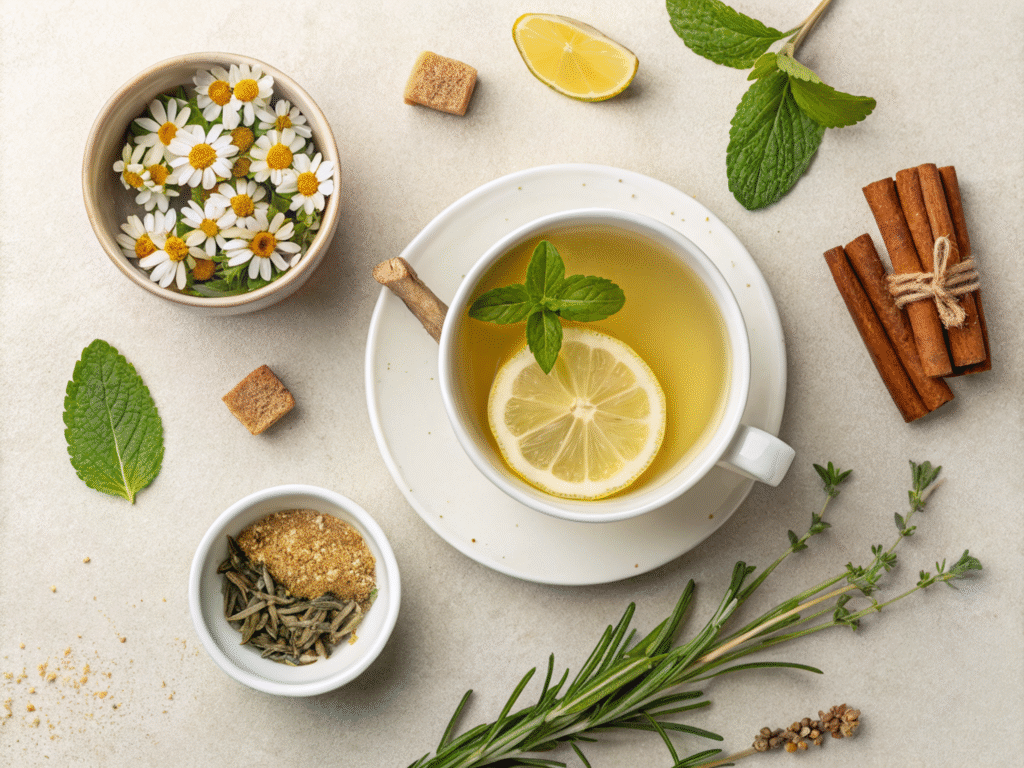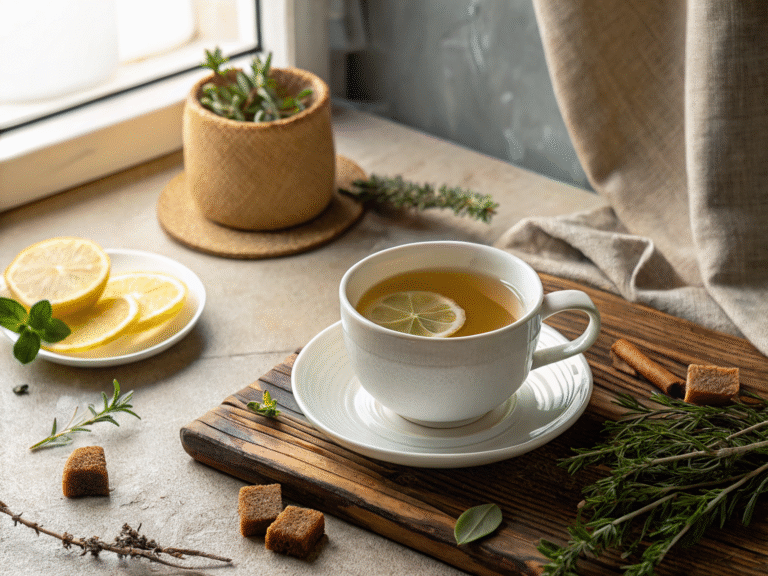It all started on a quiet, rainy afternoon. I remember the sound of the rain tapping gently on my kitchen window as I stood there, overwhelmed, tired, and emotionally spent. Work was piling up. My thoughts were spinning. My energy? Gone. I wasn’t looking for a miracle cure I just needed a moment of calm. That’s when I found a forgotten box in the pantry labeled “cortisol tea.”
I didn’t know much about cortisol back then. I’d heard it was the “stress hormone,” but I had no idea that my daily anxiety, sleepless nights, and afternoon crashes could be related to elevated cortisol levels. That first sip of warm, herbal tea did more than soothe me it started a journey of reclaiming calm, one cup at a time.
Cortisol tea isn’t a single product. It’s a growing movement rooted in ancient herbal remedies and backed by modern science. It refers to teas specifically known to help lower cortisol levels and reduce stress naturally. Unlike quick fix pills or energy drinks, these teas invite you to slow down and support your body in a more sustainable way.
What makes tea so powerful for managing stress? Certain herbs like chamomile, holy basil, ashwagandha, and lemon balm contain adaptogens and calming compounds that promote relaxation and help regulate the body’s stress response. The ritual of brewing, the aroma of steeping herbs, and the act of sipping these are all part of what makes cortisol tea so effective.
If you’re feeling the weight of daily stress, cortisol tea might be your gentle path back to balance. At SoupSip, we believe healing begins with habits. You can start today with something as simple as what’s in your mug.
Table of Contents
Teas That Naturally Lower Cortisol Levels
When stress runs high, so does cortisol a hormone that fuels your body’s “fight or flight” response. While short term cortisol surges can be helpful, long term elevation may lead to sleep disruption, fatigue, anxiety, and even weight gain. That’s where a good tea to lower cortisol steps in.

Many herbal teas have natural compounds that help regulate the nervous system and support a healthier stress response. These teas don’t just taste good they serve a functional purpose. Let’s explore a few of the best teas that lower cortisol.
Chamomile tea is often considered the gold standard. Known for its calming effects, it contains apigenin, a compound that binds to brain receptors and promotes relaxation. Chamomile helps regulate sleep, which is vital for cortisol balance.
Holy Basil (Tulsi) is another powerful adaptogen. This tea doesn’t just reduce cortisol it may also help protect the body from the effects of chronic stress. Tulsi supports adrenal function and promotes equilibrium without drowsiness.
Ashwagandha tea, a traditional Ayurvedic remedy, has been clinically shown to reduce cortisol levels in stressed adults. It works by modulating your body’s stress response system, making it one of the most respected teas for cortisol regulation.
Lemon balm tea, with its mild citrus flavor, is a gentle yet effective option. It soothes the nervous system and may help ease cortisol spikes that come with anxiety.
These aren’t just trendy wellness sips. There’s growing research showing the link between tea and cortisol regulation, particularly through compounds like L-theanine, flavonoids, and plant based adaptogens.
When and How to Drink Tea for Cortisol Reduction
Drinking cortisol reducing tea isn’t just about what you sip it’s about when and how. Timing matters, especially when you’re trying to rebalance your body’s stress rhythm.
Cortisol naturally follows a daily cycle. It peaks in the early morning, helping you wake up, and gradually declines by evening. If your levels stay high throughout the day or spike at the wrong times you’ll feel it in your mood, energy, and sleep. That’s why knowing the best time to drink tea to reduce cortisol is essential.
For many people, the ideal time is late afternoon or early evening, when cortisol should be winding down. A calming herbal blend after work can signal your body to slow down, preparing you for rest. If you wake up anxious, though, a gentle morning brew like tulsi or lemon balm can start your day on a more grounded note without caffeine.
Even more important than timing is turning tea into a ritual. Create a space for stillness. Brew slowly. Inhale the aroma. Sip with intention. This mindful approach tells your nervous system: “It’s safe now.” Pairing your cortisol tea with journaling, deep breathing, or a calming playlist can deepen the effect.
Remember, the best tea to reduce cortisol is one that fits your body’s rhythm and becomes part of your routine. It’s not just about the herbs. It’s the habit.
The more consistently you create space for calm, the more your body will respond and that’s when the real transformation begins, one cup at a time.
Combine Cortisol Tea with : Bariatric Seed Trick: Amazing Weight Loss Ritual
Choosing the Right Tea for Long-Term Stress Support
Not all teas are created equal especially when it comes to tea and cortisol. To get real results, you’ll want to be intentional about what you’re sipping. Choosing the right cortisol reducing tea starts with understanding what your body needs and how different herbs work over time.
First, look for teas made from high quality, organic herbs. Chemical residues and artificial additives can work against your stress goals. The best teas that lower cortisol are clean, simple, and pure. Choose loose leaf or minimally processed tea bags, and check for sourcing transparency.
Herbs like ashwagandha, lemon balm, and holy basil work best when taken consistently. These adaptogens build up in your system, gently nudging your cortisol levels toward balance. That means results improve with time not just one cup. Aim to enjoy your tea daily for at least two weeks before judging its impact.
Another tip? Go for caffeine free blends, especially if you’re drinking tea in the evening. While green tea has cortisol friendly compounds like L-theanine, it also contains caffeine, which could raise cortisol if consumed too late in the day.
Pairing your tea with small mindful practices can maximize its benefits. Sip slowly while reading, meditating, or just being still. Avoid sugary snacks or multitasking during your tea time it’s not just about the brew, but how you experience it.
Conclusion
Stress may be part of life but living with high cortisol doesn’t have to be. A simple, daily cup of cortisol tea can offer real relief, naturally. Whether it’s chamomile at night or tulsi in the morning, the right tea can help your body reset, your mind settle, and your routine feel more rooted.
The beauty of these teas lies in their simplicity. No prescriptions. No pressure. Just plant powered ingredients and an invitation to pause. If you’re feeling stretched thin, your next step doesn’t need to be big it can start with something as small and soothing as a warm cup of tea.
Follow me on : Pinterest
Frequently Asked Questions About Cortisol Tea
1. What tea is best for reducing cortisol levels?
The best teas for lowering cortisol include ashwagandha, holy basil (tulsi), lemon balm, and chamomile. These herbs are rich in adaptogens or calming compounds that help regulate your body’s stress response. For optimal effect, drink them regularly and choose high quality organic blends.
2. Does drinking tea help lower stress hormones like cortisol?
Yes, specific teas can help lower cortisol and ease the effects of chronic stress. Herbal teas like chamomile, tulsi, and lemon balm contain compounds that promote relaxation and support the adrenal system, which controls cortisol production. A consistent tea routine may naturally bring cortisol levels back into balance.
3. How often should you drink tea to reduce cortisol?
For best results, enjoy 1–2 cups daily of a cortisol reducing tea. Herbs like ashwagandha and tulsi work gradually, so consistency is key. Drinking your tea at the same time each day especially during stressful moments or before bed can amplify its effects over time.
4. Is green tea or chamomile better for cortisol reduction?
Chamomile is typically better for direct cortisol reduction because of its strong calming effects and lack of caffeine. Green tea, while rich in L-theanine, does contain caffeine, which can raise cortisol if consumed in excess. For evening routines, chamomile is the preferred choice.
5. When is the best time to drink cortisol-lowering tea?
Late afternoon or evening is ideal for drinking cortisol lowering tea, as cortisol levels should naturally decline during this time. However, if you wake up feeling anxious, a morning cup of tulsi or lemon balm can offer gentle balance without overstimulation.
Disclaimer About Cortisol Tea
This article is for informational purposes only and is not intended as medical advice. While cortisol tea and herbal remedies may support stress management, they are not a substitute for professional healthcare. Always consult your physician or a qualified health provider before beginning any new dietary or wellness regimen, especially if you are pregnant, nursing, taking medications, or managing a health condition.
Herbal teas can interact with medications and affect individuals differently. Use with care, and listen to your body.

Cortisol Tea – 5 Powerful Teas That Reduce Stress Naturally
- Total Time: 10 minutes
- Yield: 1 cup 1x
Description
A soothing herbal cortisol tea blend to help lower stress naturally, featuring tulsi, chamomile, and ashwagandha.
Ingredients
1 tsp dried tulsi (holy basil)
1 tsp dried chamomile
1/2 tsp dried lemon balm
1/2 tsp dried ashwagandha root
8 oz hot water
Optional: honey or cinnamon
Instructions
1. Boil fresh water and let cool for 1 minute
2. Add all herbs to a teapot or infuser
3. Pour hot water over herbs
4. Cover and steep for 7–10 minutes
5. Strain, sweeten if desired, and enjoy warm
Notes
Drink 1–2 cups daily for consistent stress support
Use organic, high-quality herbs for best results
Avoid caffeine after 3 PM to prevent cortisol spikes
- Prep Time: 2 minutes
- Cook Time: 8 minutes
- Category: Tea
- Method: Steeping
- Cuisine: Herbal Wellness
Nutrition
- Serving Size: 1 cup
- Calories: 3
- Sugar: 0g
- Sodium: 0mg
- Fat: 0g
- Saturated Fat: 0g
- Unsaturated Fat: 0g
- Trans Fat: 0g
- Carbohydrates: 1g
- Fiber: 0g
- Protein: 0g
- Cholesterol: 0mg
Keywords: cortisol tea, tea to lower cortisol, herbal tea stress

